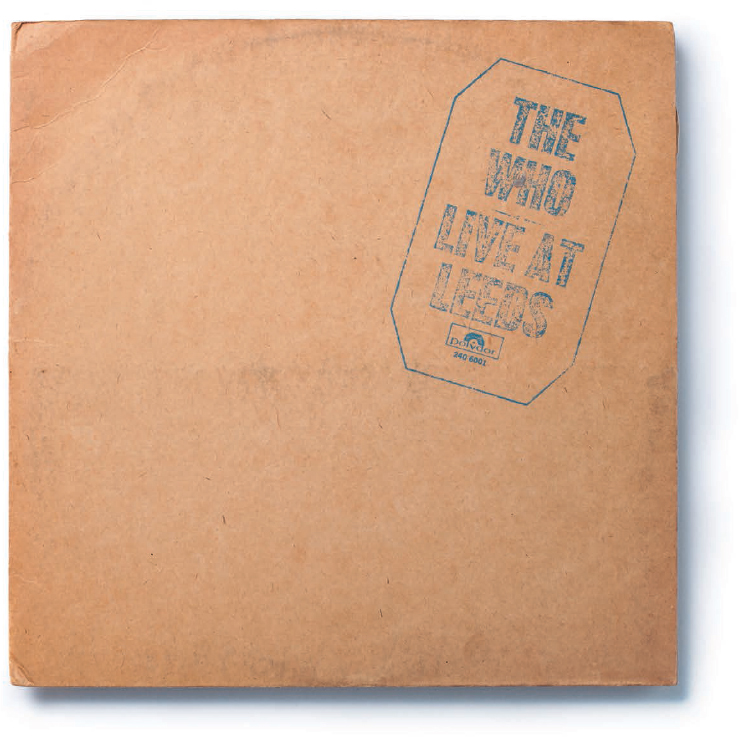
Track/Decca
Produced by Jon Astley, Kit Lambert and the Who
Released: May 1970
TRACKLISTING
01 Young Man Blues
02 Substitute
03 Summertime Blues
04 Shakin’ All Over
05 My Generation
06 Magic Bus
The best live album ever recorded. Hands down. In the five years prior to Valentine’s Day 1970, the Who had gone from a pimply London mod band to authors of Tommy, the first ‘rock opera’. Tommy gave the Who a conceptual edge over their rival the Rolling Stones. But it also made them seem more than a little pseudo-intellectual.
Whether to counter the pretension of Tommy or just to get something into the market, the Who decided to make a live album. According to then-manager Kit Lambert, ‘In those days live albums were always Live at the Coliseum in Rome or Live at the Palladium or the Hollywood Bowl. I said, “live” isn’t really like that. Touring is much seedier. So why didn’t we think of Live at Grimsby or Live at Mud-on-Sea. I looked at the schedule and said, “You’re in Hull on Wednesday and Leeds on Thursday, so it’s going to be Live at Hull or Live at Leeds”. Things didn’t go too well at Hull, so it had to be Leeds.’
It may have been as prosaic as that but Live At Leeds – packaged like a bootleg – is the most profound conceptual statement the Who made – rock operas notwithstanding. The concert at Leeds went for much longer than the originally released vinyl album, with the band choosing to edit out the rock opera Tommy, the mini-opera ‘A Quick One’ and many of their great ’60s singles. The album’s track-listing would be bizarre if it wasn’t so exhilarating: what we have on side one is two covers about being an angry young man (‘Summertime Blues’, ‘Young Man Blues’), a version of the first British rock & roll song (Johnny Kidd’s ‘Shakin’ All Over’) and the Who’s best early single (‘Substitute’).

The Who were a band of four soloists: Roger Daltrey carried the songs, John Entwistle’s bass carried most of the riffs and the melodies, Townshend’s guitar ripped the songs to pieces and Keith Moon’s drums detonated explosions under everything.
Side two has a 15-minute version of the Who anthem ‘My Generation’. It starts off with a straight reading of the single and then goes off into an improvisation on the musical themes of Tommy. As John Wood in the New Yorker put it, ‘John Entwistle’s incessantly mobile bass was like someone running away from the scene of the crime, and Keith Moon’s drumming, in its inspired vandalism was the crime itself’.
Moon’s drumming is the key to the genius of the Who. As Wood said, ‘The first principle of Moon’s drumming is that drummers do not exist to keep the beat. He did keep the beat, and very well, but he did it by every method except the traditional one … he is in revolt against consistency. Moon’s drumming is about putting things in the wrong place: the appearance of astonishing disorder.’ The unpredictability of Moon’s drumming kept the music alive. He rode the kick drum, impatiently punching out accents to the beats and his cymbals were like a riot. With Moon in his prime the Who could never become rigid or rehearsed, every bar had to be discovered anew. The rhythm section in the Who was so forceful that it came on like a hurricane – completely unpredictable and violent. When the music goes quiet you know it’s only the calm before another blistering storm. ‘My Generation’ ebbs and flows with Townshend calming the waters and then waving the tsunami of Moon and Entwistle to overwhelm him. The melodies are almost simplistic but the sheer explosive weight of the Who as an entity is a wonder to behold. Wood’s description of Keith Moon perfectly sums up Live at Leeds: ‘Formally controlled and joyously messy. Propulsive but digressively self-interrupted, attired but disheveled, careful and lawless, right and wrong.’